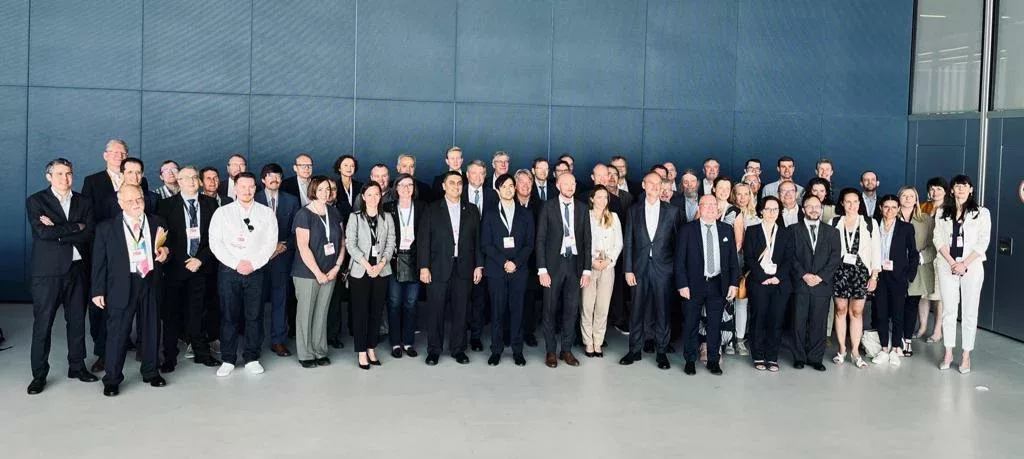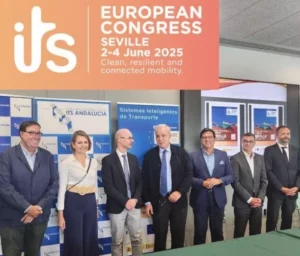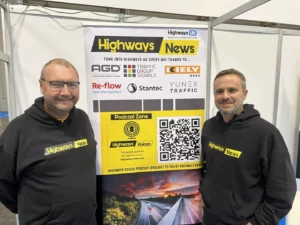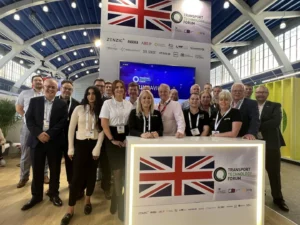Around 80 Ministers, Mayors, Industry Leaders and Senior Representatives of national and Local Governments from 20 countries have met in Toulouse to review how intelligent and green mobility can contribute to sustainable growth and a better quality of life and environment for all citizens.
The ITS Policy Summit was a key highlight of the 2022 ITS European Congress, which has as its main theme: Smart and Sustainable Mobility for All. The participants enjoyed this opportunity to meet their European counterparts from all transport sectors to discuss common challenges and possible solutions. They also looked at emerging issues where closer collaboration could benefit all parties.
Nicholas Misiak, representing the Congress Host city of Toulouse, welcomed the guests to the ITS Summit saying, ‘We are so happy to welcome the ITS Community to Toulouse. Toulouse is certainly a city that offers all sides of innovation from the underground to space so it is the perfect city to host the largest European ITS mobility event under this year’s theme „Smart and Sustainable mobility for all“.
ERTICO–ITS Europe Chairman Dr. Angelos Amditis said, ‘The ITS Summit is a very productive way for ERTICO to gather the views of European cities, industry, decisions makers and other stakeholders to guide a future strategy for providing smarter, more sustainable and integrated mobility. This year the ITS Summit is focusing on data, which is the glue between transport and mobility, as well as the goldmine of the future transport system.
We need to harnass the power of data and data sharing to enable the journey for Europe’s economic growth and societal development. Data holds the key to answering the needs of our sectors with better decision making and greater efforts to ensure that all players cooperate within a fair and secure data framework. ERTICO welcomes and strongly collaborates with the efforts and goals of the European Commission in this area.‘
The goal of the ITS Summit is to encourage unrestricted cross-sector discussion on transport concerns and priorities at city level, to identify best practice and publicise it, pin-point the barriers to delivering policies or services and establish if they are well understood or need research.
This year’s ITS Summit in Toulouse focused on exploring the practical aspects of the Mobility Data Space – a data sharing community for everyone who is looking to build the future of mobility. Discussions considered five aspects:
- Data ownership; protection; privacy
Proposed European legislation would give more autonomy to data providers/generators to transfer their data and/or reuse their data. However many end-users – for example drivers of connected cars – do not realise that they are both data generators and data owners and that there is a widespread need for education to explain to users the implications of the proposed liberalisation. There is already a degree of reticence about storage and handling of personal data and users need to be reassured of the benefits that data-sharing brings. Discussion revolved around whether all transportation data should be given equal importance.
- Access to data across all data markets.
Up to now the major part of transport data has come from road vehicle and train manufacturers who have had ready access to data. The Summit felt that action needs to be taken to encourage the sharing of data so that a wide range of organisations could use it to deliver wider access to mobility services and offer a greater number of services that could potentially include road safety and road maintenance. Having the data is only one half of the story, investment is needed to ensure that the services resulting from data-sharing are delivered.
- Inclusion and digital divide
Developing the availability and use of data in all modes of transport was seen as key for making mobility safer, more efficient and accessible in a sustainable manner for the benefit of everyone. However there are already social divisions – not everyone is digitally fluent and at ease with services provided through personal computers, tablets, smartphones. The Summit identified a strong demand for greater educational actions by cities and governments to break down barriers and make the invisible visible i.e those who are unable to follow the technological evolution. For example participants mentioned the idea of a special user category for specific ticketing.
- Interoperability
This was recognised as a difficult issue. On the one hand users want choice to be able to combine services based on dedicated apps with different services from a different provider. They do not want to be tied forever to one supplier so the availability of open and public platforms is key. But there is also a commercial dimension: being first to the market may mean deciding what interfaces to use and suppliers following on might feel there is a better but different choice. If a city is funding public infrastructure it is sensible to base it on a common city user interface permitting „one stop“, interoperable access for all mobility services in the region.
- Mobility data sharing across public and private sectors
There were interesting discussions about ‘entitlement‘ reflecting who has funded which element. The Summit was clear that there could, and should, be a greater opening up of the data held by both the public and private sector and achieving that needs more discussion and perhaps more mutual trust. As someone commented: ‘Trust is the cornerstone of the eco-system‘. Government needs to find ways to adapt regulations more rapidly – innovatory services are too often seen as a threat by regulators. However, proposers of innovatory services need to remember that public transport infrastructure is designed for a very long life and the public sector needs to protect this investment. Regulation needs to be addressed as a partnership.
The Summit delegates were pleased to have the opportunity for a full and frank exchange of views on sensitive and complex issues. They concluded:
- Data is essential to power new ITS solutions and encourage the greening of our society and its mobility systems;
- Ownership of data and access to it is complex and should be treated Europe-wide, not nationally nor locally;
- Availability of data, and data sharing needs to recognise that the public and private sector have different objectives and obligations;
- The supply of data needs to reflect its importance for example in the case of road safety;
- Education and awareness are essential for every stakeholder; guidelines for both private and public sector are required but also engagement with the general public to ensure they buy into the use of their data;
- Trust between all stakeholders is the corner-stone of the mobility eco-system and essential for data sharing;
- Development of data for wider use in mobility needs greater cooperation between the private and public sector;
- A clearly specified regulatory framework is required particularly for the private sector;
- It is difficult to collect data for inclusiveness because many people involved are invisible to current data supply – it is important to find a way to do this;
- It has been demonstrated that a successful national data market encourage the devleop of regional mobility markets and catalyse modal shift for users.
- Questions still remain as to whether the data market is failing or not, and the agree to which a basic regaulatory framework is necessary.
- Data management is a balancing exercise on several levels: Between data owners and data users; between the end goals of the public sector (serving the citizens and the societal return on investment, and the private sector (serving the financial return of investment); and finally between established players and new disrupters.
(Picture – ERTICO)




















